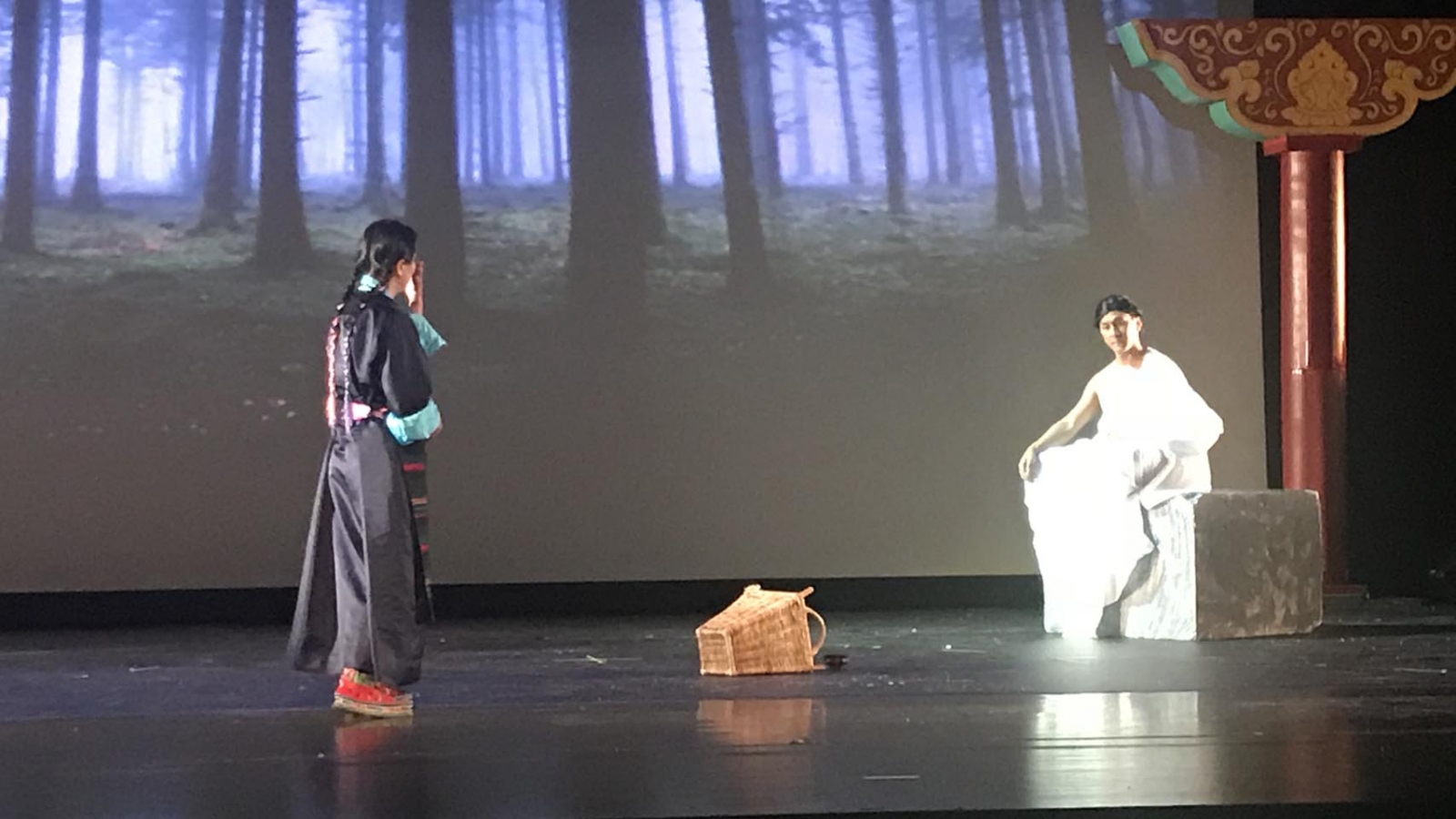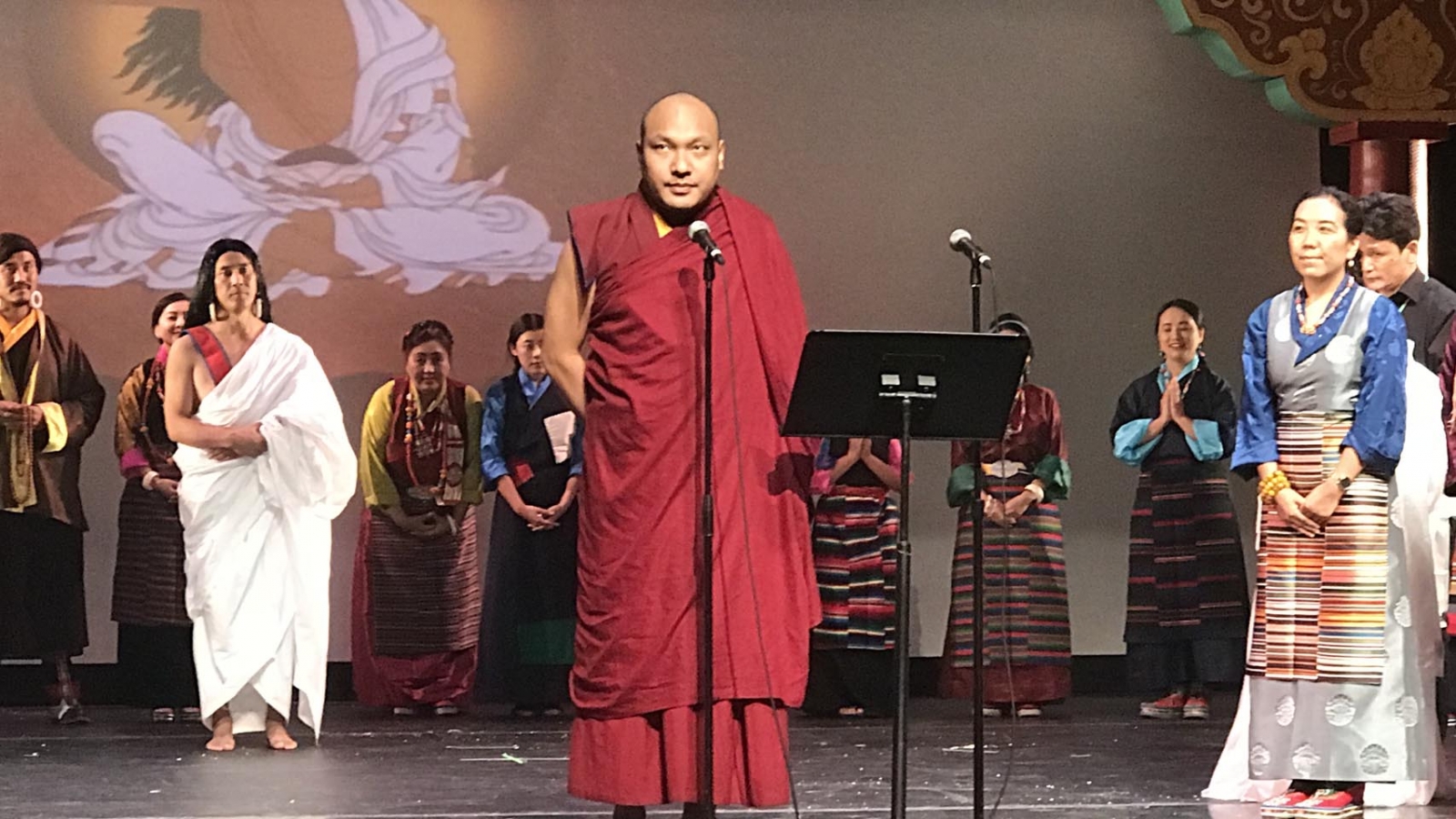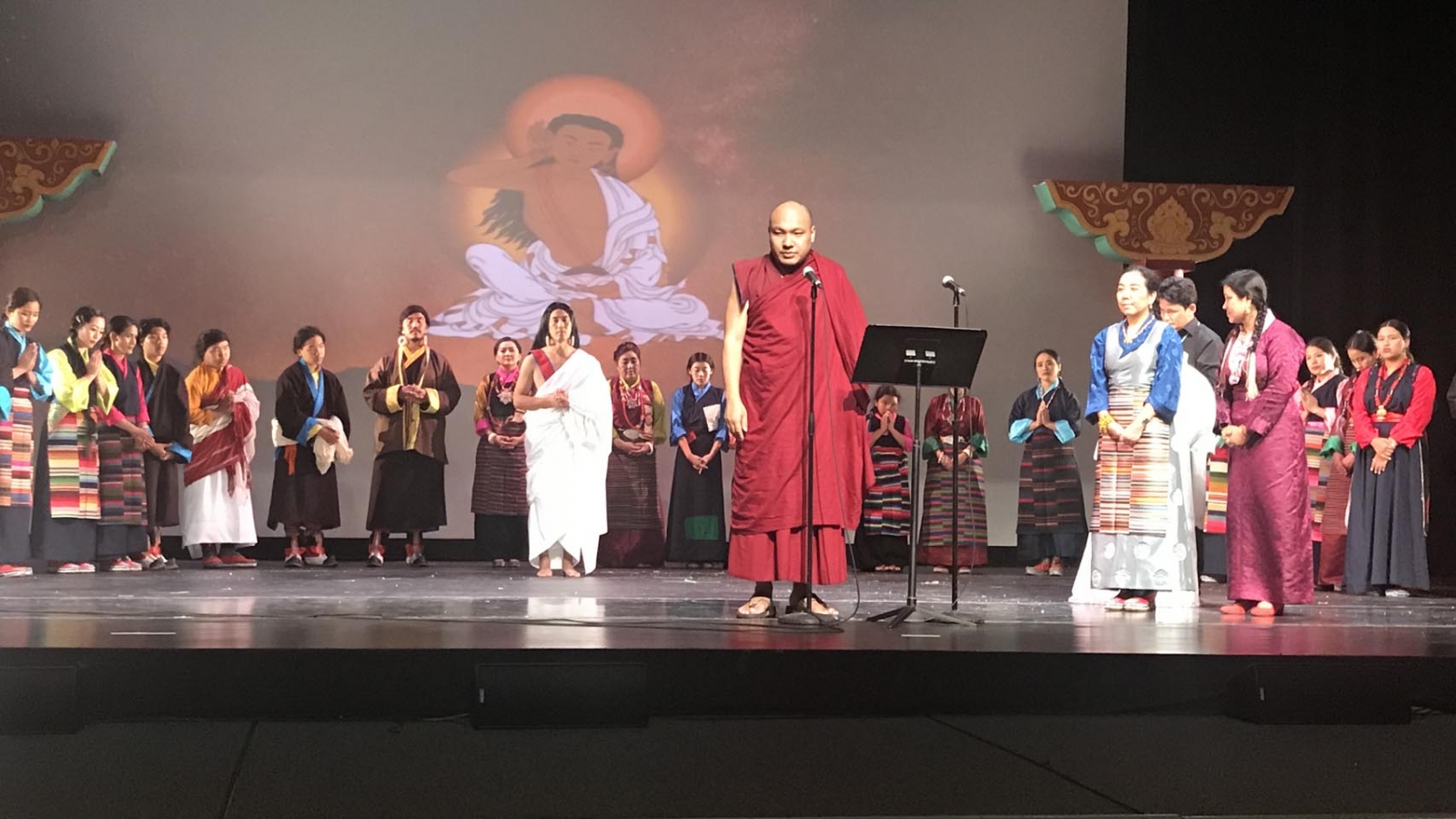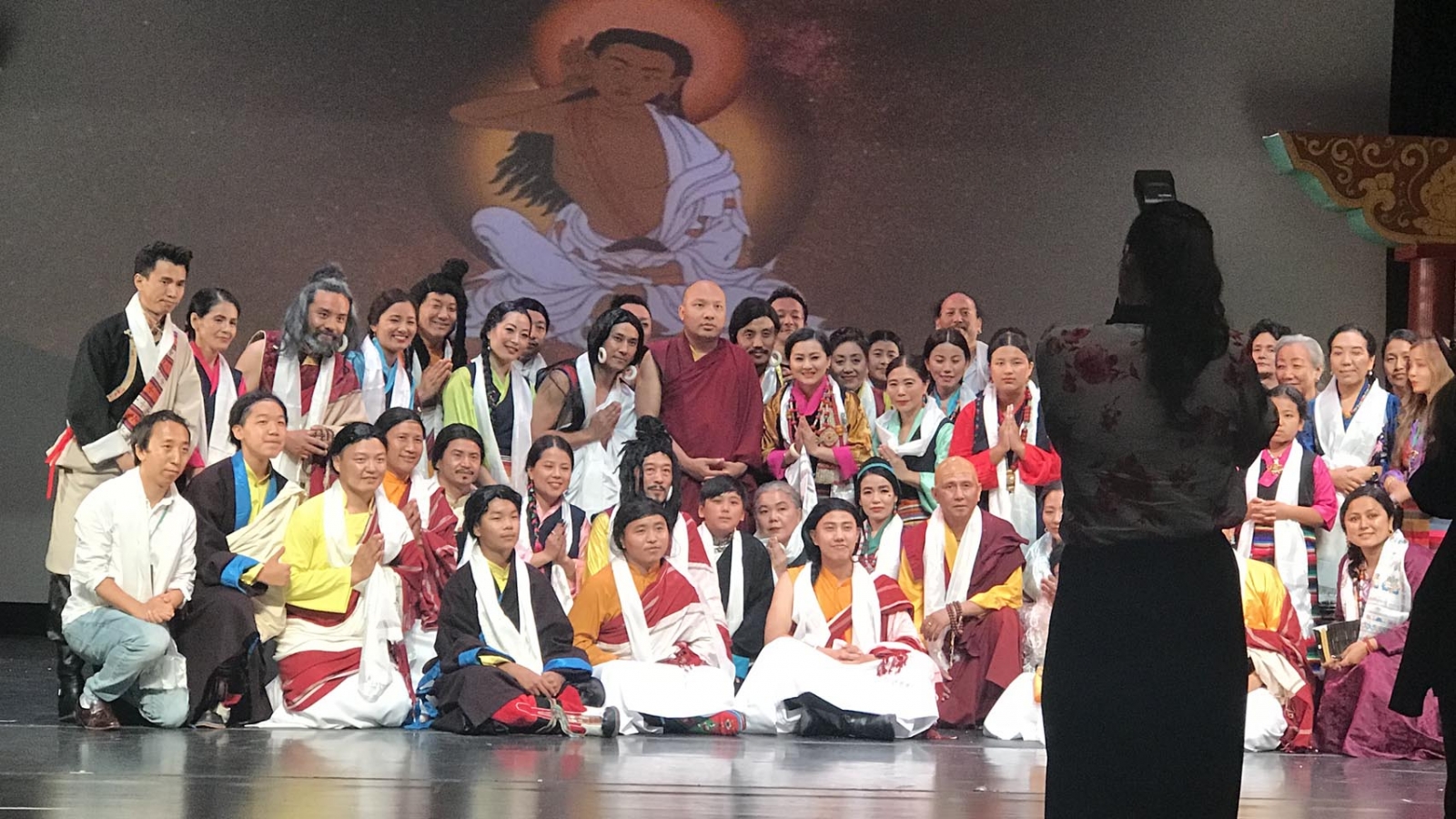LaGuardia Performing Arts Center, Long Island City, New York // July 1, 2018
I prostrate to that supreme being,
Known by the name of Thöpaga,
Who shone like the sun on a snowy peak
In the pitch-black darkness of the north.
The Mahasiddha Naropa’s praise of Milarepa opens the Gyalwang Karmapa’s play about his life. After six months of preparation, it was beautifully staged by members and friends of the New York Tibetan Services Center. Its founder and director, Tsering Deki, explained, “For two years, we have been thinking about a Milarepa play but we did not have a script to follow. We were so lucky that His Holiness the Karmapa was here in America and we had an audience with him. I asked if we could use his script, and he happily said, ‘Yes, of course. Any support you’d like, I’m right behind you.’ Those words of support meant a lot. It made me feel that I’m going to make this the best show so that he and the rest of the Tibetans can be proud of it.”
The Karmapa did give them a lot of support by adapting the play from the six hours it took for the 2010 performance in India to a shorter two-hour version for New York. He was also available for discussion in person and via texts and, he came to the rehearsal that took place on his birthday in June. Tsering Deki recalled her special request to the Karmapa: “I wanted to create an extra song for Marpa’s wife Dagmema, because I felt that all the beautiful songs were coming from Marpa, but there should be female songs, too. So I went back to the Karmapa and asked him, ‘Could you please give us a song for Dagmema?’ So he composed one for her.”
Tsering Deki continued to explain, “We really worked hard. Because of who the playwright was, everyone was excited to take a part in the play and do their best. Some wanted to share their artistic talent, and some have so much devotion for the Karmapa that they wanted to make sure that what he wrote came out in a perfect way.” From April, they had rehearsed every other night. The actors included a nine-year-old girl and a ten-year-old boy, two teenagers, a college student, a policeman, an accountant, housewives, and nurses as well as members of the famous Tibetan Institute for Performing Arts, (TIPA) who were professionally trained in India and have traveled the world to present Tibetan culture. Two of them had participated in the original presentation of the play Bodh Gaya, India in 2010.
For the staging this evening, the TIPA artists were the main actors (including Milarepa and Dagmema) and they also took the role of teachers, fine-tuning the work of others and passing along the best of their tradition to a younger generation, who were performing in Tibetan for the first time. Tsering Deki noted, “We also have young members who grew up in America and are excited about this Tibetan play. They want to take part in it. So we facilitated an opportunity for them to speak Tibetan and be part of the play.” Not only did their Tibetan improve, she continued, but also “Especially starting with this play, they started paying more attention to the culture. Even though they are Tibetan, they have not had the opportunity to see how Tibet used to be. In practicing here, they got the idea of what life in Tibet was like, how Tibetans related to each other, and how they behaved.”
Looking forward to the future, Tsering Deki also spoke of the intersection between tradition and the modern world. “We are trying to convert Tibetan traditional performances into a more western style without losing their Tibetan feel to the point that young Tibetans can still enjoy the show.” During the performance, this was especially evident in three areas: the use of stage-wide backdrops, the addition of natural sounds to simulate the environment and music to modulate feelings, plus a softening of stylized gesture with natural movement. Further, summaries of the Five Acts as well as a running translation of the Tibetan were shone in bright white letters on a wall to stage right.
The wedding scene illustrated some of these shifts to modernize the performances. An image of a large traditional stone house in the mountains of Tibet filled the back wall of the stage while sounds of people chatting and eating augmented the aural landscape of the actors on stage conversing with each other at the wedding party. The festive event also provided an occasion for the dancers from TIPA to escort the bride into her new home and perform a lively traditional dance. Afterward, they broke from their ranks with natural gestures as they formed small groups in conversation. Soon, the buildup of storm conjured by Milarepa was dramatically portrayed on the back screen with music in frightening crescendos, instilling some of the terror the guests must have felt.
In another scene, Milarepa is sitting in a cave with chill mountain vistas of snow-covered peaks stretching out behind him. Wind is whistling as Marpa and Dagmema come to visit him. After she helps him to break down the walls, Milarepa offers his experiential understanding to them and then sings:
I have no way to repay the kindness
of my extremely kind lama and consort.
Thus I offer my practice continually.
May the results of my practice benefit beings.
The play is full of these Dharma teachings and advice, such as Marpa’s last instruction to Milarepa, which ends: “Better than making material offerings to me, what would gladden the heart of an old man like me would be for you to meditate in mountain retreats and plant the banner of practice.” The play then depicts the years Milarepa spent in the caves of the Himalayas, practicing as Marpa requested. In the last scene of the play, the actors chant a famous prayer to Milarepa, “Lord Mila Shepa Dorje, we supplicate you!”
As the lights came up, the two women returned to the front of the stage to thank the many people who had made the production possible. His Holiness was invited to say a few words and, standing in the center of the stage, he gave long white scarves to all the participants—those who had been on stage, and those off stage who supported them. A sense of joy permeated the scene and, as Tsering Deki noted, “Many people were looking for the words to express what all crew members feel about having the chance to be in the play when His Holiness the Karmapa is right here in front of us. And actually, there are no words that can express this feeling.”







